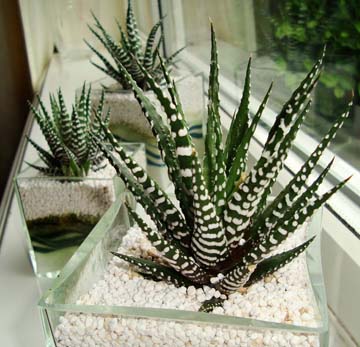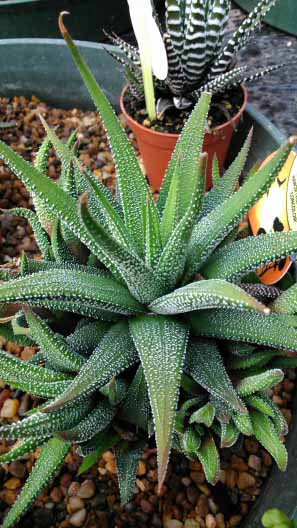





Haworthias are dainty succulent plants which are frequently compared to Aloes, this is hardly surprising since they are both members of the Asphodeloideae family.  Haworthias are almost always small and very (very) slow growing plants but tend to look brilliant in unusual containers or interesting soil mixes. As a result they can make fantastic easy care gifts and presents for people, suiting either a home or office desk environment.
Haworthias are almost always small and very (very) slow growing plants but tend to look brilliant in unusual containers or interesting soil mixes. As a result they can make fantastic easy care gifts and presents for people, suiting either a home or office desk environment.
There's quite a variety to choose from, although the most popular is H. attenuata and H. fasciata, both are commonly known as the Zebra Cactus. The white wart like tubercles cover the back of the leaves often in a stripy arrangement which resembles a Zebra stripe pattern. H. margaritifera or the Pearl Plant has slightly wider leaves and the "warts" are more dotted and spaced out producing a "pearl" type of effect. H. tessellata or Star Window Plant is the other Haworthia you are likely to come across, instead of white warts, the ones on this plant are semi-transparent "windows" (see third gallery picture to the right).
All will produce flowers, usually a few weeks after the "longest day" of the year, i.e. in Summer. However the flowers aren't very exciting, although because Haworthia is a very slow and compact plant not much happens visually during the year therefore the flowering period can be a welcome treat to show that your plant is actually "alive".
Light
Will take various light conditions, but neither direct sunlight or deep shade.
Watering
A surviving plant will get by with watering just once a month, however to get the plant thriving it will need to be done at least once a fortnight. Very tolerant of underwatering, but will succumb quickly to rotting if overwatered.
Humidity
Not important.
Feeding
Feed your Haworthia very occasionally and when you do, ensure it's only a weak solution.
Temperature
Average warmth between Spring and Autumn / Fall. Cooler in Winter although if possible, not "cold" and absolutely no lower than 4°C / 40°F.
Repotting
 It's rare for any Haworthia to out grow its pot quickly, therefore repotting is only required infrequently and usually only when offsets have filled the pot. Once the time has come, just choose a pot slightly bigger than the last and use a similar soil composition to what was being used previously.
It's rare for any Haworthia to out grow its pot quickly, therefore repotting is only required infrequently and usually only when offsets have filled the pot. Once the time has come, just choose a pot slightly bigger than the last and use a similar soil composition to what was being used previously.
Propagation
When you repot your Haworthia you can separate the offsets from the parent. Use a sharp knife and cut as close to the parent plant as possible, ensure the offset has some roots. Wait a day for the offset to dry slightly (this reduces the chances of the raw "wound" from rotting), then pot up in a small container using a standard potting or cactus compost mix. Water and keep warm.
Speed of Growth
Slow. Although some of the fleshy varieties such as H. margaritifera or the Pearl Plant grow a little faster.
Height / Spread
Haworthia is a small plant by design and anything from 4 cm (2 in) to 20 cm (8 in) in height is usual. The flower stem however can be quite substantial in length.
Flowers
Yes this is a flowering houseplant. The flowers appear in Summer months on the end of a long stem (inflorescence) if they have been treated well during the year.
Anything else?
They are compact plants so can easily be grouped in different sized containers to add visual appeal.
Copyright © www.100flowers.win Botanic Garden All Rights Reserved